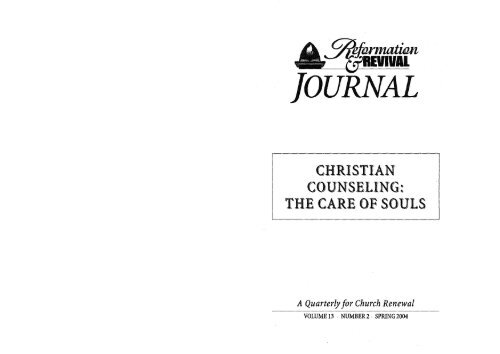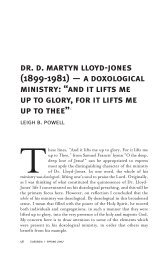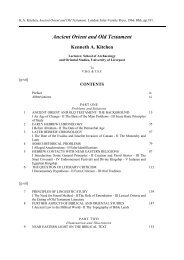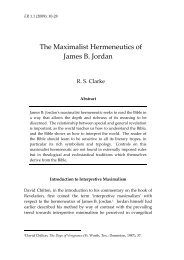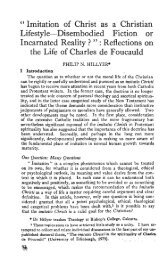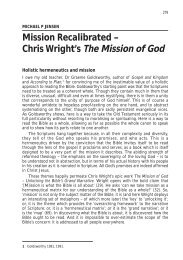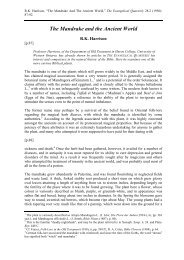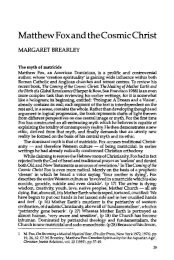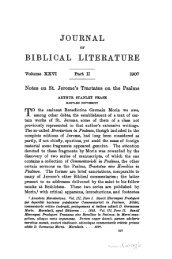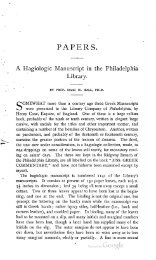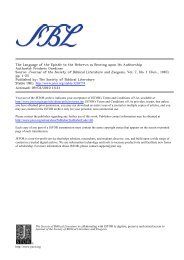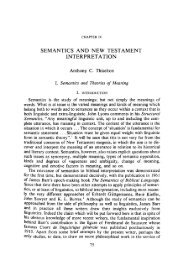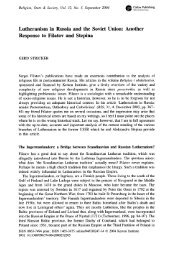"A Reformation & Revival Journal Interview with Diane Langberg ...
"A Reformation & Revival Journal Interview with Diane Langberg ...
"A Reformation & Revival Journal Interview with Diane Langberg ...
Create successful ePaper yourself
Turn your PDF publications into a flip-book with our unique Google optimized e-Paper software.
JOURNAL<br />
CHRISTIA.N<br />
COU'NSELING:<br />
THE CARE OF SOULS<br />
A Quarterly for Church Renewal<br />
VOLUME 13 ' NUMBER 2 . SPRING 2004
'Weo-orthodox theologians of the Lutheran tradition (like<br />
Bultmann) emphasized that God's grace accepts us just as we<br />
are and frees us from the necessity of having to do or achieve<br />
anything to make ourselves worthy of God's and other's love<br />
and acceptance. Neo-orthodox theologians influenced by the<br />
Calvinistic tradition (like Brunner, Barth, and Bonhoeffer)<br />
also knew about this "justifying" grace of God but believed<br />
that it leads to passivity, self-centeredness and irresponsibility<br />
unless it is complemented by an emphasis on the "sanctifying"<br />
grace of God that confronts and exposes human sinfulness<br />
and requires and enables changed lives. The neo-orthodox<br />
revival of this classical Lutheran-Calvinist debate still<br />
reminds pastors of the danger of emphasizing one form of<br />
grace <strong>with</strong>out the other, and of the importance of both<br />
"being" and "becoming" for authentic human existence.<br />
SHIRLEY GUTHRIE, DICTIONARY OF PASTORAL CARE<br />
AND COUNSELING, 781.<br />
1f n contemporary pastoral care and counseling, technique<br />
and skill present an important, largely unresolved issue. For<br />
while there are specific techniques that can be learned, the<br />
church has historically sensed that care and counseling<br />
require qualities of faith, integrity, and wisdom in the pastor<br />
that exceed any mere application of technique.<br />
BRUCE M. HARTUNG, DICTIONARY OF PASTORAL<br />
CARE AND COUNSELING.<br />
T<br />
The Art of Bearing Burdens<br />
<strong>Diane</strong> <strong>Langberg</strong><br />
he art of bearing the burdens of others <strong>with</strong>out being<br />
crushed by them is of crucial importance to someone in<br />
my profession. The bulk of my time is spent, hour following<br />
hour, in hearing about suffering in the lives of others. Actually,<br />
it is far more intimate than simply hearing about it, for it<br />
involves an entering into the suffering <strong>with</strong> them in ways that<br />
have deeply touched me. Such work is not the peculiar<br />
domain of those in the counseling profession though we may<br />
engage in it more intensely. The Word of God calls all of us to<br />
carry one another's burdens (Galatians 6:2) and so that<br />
means that burden bearing should be characteristic of the<br />
Church of Jesus Christ. What does it mean to bear the burdens<br />
of others and how can we do it effectively?<br />
One of the ways that we as human beings learn is by<br />
watching another ao what it is we need to learn to do. I am<br />
sure most of you have memories of learning to swim or ice<br />
skate or play tennis. Part of the way you were taught was by<br />
the teacher saying over and over again-fINo, not that way; do<br />
it this way. Watch me." You would watch and try again.<br />
For me, the best way I know to learn what it means to bear<br />
the burdens of others is to look first at the one who has done<br />
so perfectly. "Surely he has borne our griefs and carried our<br />
sorrows" (Isaiah 53:4). That statement means many things
58 THE ART OF BEARING BURDENS<br />
THE ART OF BEARING BURDENS 59<br />
and surely one of them is that Christ was the Chief Burden<br />
Bearer. If we are to learn to bear one another's burdens then<br />
we must know Christ. Paul gives us a marvelously rich statement<br />
in Philippians that will help us understand the art of<br />
bearing burdens. The statement begins <strong>with</strong> knowing the one<br />
who has born ours: ". .. that I may know him and the power<br />
of his resurrection, and may share his sufferings" (Philippians<br />
3: 10). I would like to use this verse to show you what I believe<br />
are the characteristics of a true burden-bearer.<br />
The first and foremost characteristic of one who is going<br />
to bear burdens is that we know Christ. Bearing burdens has<br />
to be rooted in something or we will be utterly crushed by it.<br />
To sit <strong>with</strong> the suffering of others for its own sake will eventually<br />
lead to despair, for there is no end to it. No matter how<br />
much brokenness you minister to, how much death you sit<br />
<strong>with</strong>, how many hurt people you hold, there will always be<br />
more. And even beyond that, there are many we can give to<br />
deeply and see no change or response. None of us can stand<br />
that for long <strong>with</strong>out being crushed or fleeing from it. And so,<br />
Paul starts us <strong>with</strong> our foundation-"that I may know him. II<br />
When we consider the life of our Lord Jesus Christ we<br />
notice that his first obedience was always to the will of his<br />
Father, not to the needs of humanity. He taught us again and<br />
again, that the greatest commandment was to "love the Lord<br />
your God <strong>with</strong> all your heart and <strong>with</strong> all your soul and <strong>with</strong><br />
all your mind" (Matthew 22:37).<br />
If obedience to God is not primary several things will happen.<br />
One is that we will try to enter into the suffering of others<br />
in a way that is truly self-motivated. It is simply disguised selfishness.<br />
We like how it makes us appear to others, we like how<br />
it makes us appear to ourselves, or it meets some need in ourselves,<br />
such as the need to feel important, significant, or valued.<br />
When this is the case, the relationship is governed by our<br />
own needs, not those of the other person. We end up structuring<br />
the relationship so that it takes care of us, often at the<br />
expense of the one who is suffering. One obvious, though<br />
sadly not uncommon, example of this is when a counselor or<br />
pastor ends up sexually involved <strong>with</strong> a client: However, all of<br />
us have been guilty of using another to meet our own needs in<br />
more subtle ways. We make a comment to elicit a compliment<br />
or we manipulate someone into doing something for us and<br />
we do it all under the guise of being there for them.<br />
Another motivator might be that we enter into the suffering<br />
of others to avoid dealing <strong>with</strong> our own pain. I will help<br />
you, tend to your wounds, and be there for you in an attempt<br />
to not face my own pain. It is our nature to hide from our<br />
own struggles or brokenness. We don't like pain of any kind,<br />
least of all our own. Sometimes the best way to run from<br />
mine is to get lost in yours.<br />
Without some grounding, you and I will either avoid the<br />
suffering of others or drown in it. We may end up trying to<br />
help from selfish motives or out of some skewed, messianic<br />
view of ourselves. It is only as we know Christ, seek him, and<br />
obey him that the delicate adjustment of our two callings: to<br />
love God and to love others, can be brought about. The Spirit<br />
of God and the Word of God can only bring about this adjustment,<br />
for they ever put first things first. The first thing is love<br />
and obedience to God, and the second, service to humanity.<br />
How quickly we reverse them!<br />
John 1 tells us lithe Word became flesh and dwelt among<br />
us, and we have seen his glory, glory as of the only Son from<br />
the Father, full of grace and truth ... grace and truth came<br />
through Jesus Christ II (1:14,17). Knowing him who is both<br />
grace and truth will be what enables us to bear the burdens of<br />
others in such a way that we reflect who he is in this world.<br />
Knowing him who is grace keeps us humble before God<br />
and before others. If we truly know his grace we will never<br />
approach others <strong>with</strong> condescension or impatience. If we<br />
know him who is grace we will not quit when the way is long<br />
and hard. If we truly know his grace we will not judge or condemn<br />
when the struggles of others do not make sense to us<br />
and it would be easy to callously say that they brought their<br />
suffering on themselves. To truly know and experience the<br />
grace of God toward us is to know that we can never despair<br />
of another human being and that we will never encounter<br />
anything in another that God has not or cannot locate in us.
60 THE ART OF BEARING BURDENS<br />
THE ART OF BEARING BURDENS 61<br />
As we are steeped in God's grace toward us, we will extend<br />
that graciousness to others. We who have received grace upon<br />
grace upon grace will willingly, delightedly extend that same<br />
grace to those who suffer. And we will know that when we<br />
find ourselves ungracious, judgmental, selfish or harsh in any<br />
way, that it is a reflection of our failure to know him in some<br />
way, or to love him in some way, rather than a problem <strong>with</strong><br />
the person who sits before us. If I am impatient <strong>with</strong> you it is<br />
not because you are slow (though you may be), but rather<br />
because my heart is full of impatience. Every encounter <strong>with</strong> a<br />
lack of grace in our hearts will have the effect then of sending<br />
us back to our knees to know him yet even more.<br />
Knowing him who is truth is what will keep us grounded<br />
in the truth. Sitting <strong>with</strong> suffering has great potential to keep<br />
us from truth. One of the ways this can happen is that we lose<br />
sight of God and who he is. We begin to believe that he is not<br />
good. We begin to believe that he is not love. You cannot sit<br />
<strong>with</strong> the sexual abuse of little girls, a baby dying from Aids, a<br />
battered wife, parents who are grieving over the loss of a child,<br />
the erosion of a life by cancer and a thousand other things<br />
<strong>with</strong>out asking questions. If you do not ask questions, I doubt<br />
you have truly entered into the suffering of others. Suffering<br />
rarely makes sense. Oh, we work very hard to try to make<br />
sense out of it. We write books on why it happens and the<br />
good that comes out of it. I often think that the ability to most<br />
easily explain suffering is the clearest indication of never having<br />
suffered. However, if we look suffering full in the face and<br />
do not truly know Christ, it will end up in our slandering<br />
him, hating him. And so we must continually seek the one<br />
who is truth, reminding ourselves of his truth, when all the<br />
evidence screams to the contrary.<br />
The second aspect of knowing him who is truth is that we<br />
are continually hindered from taking ourselves so seriously.<br />
We know the truth of whom we are, sinners saved by grace<br />
and who, like our Master, we have been called to serve. Our<br />
self-importance, our certainty that our way, our system is<br />
better, end up falling by the wayside, replaced instead by the<br />
desire to see ourselves in truth before him. It is only this that<br />
will keep us from deceiving ourselves. Otherwise we will end<br />
up pushing on others, saying it is for their good, when in reality<br />
it is because of our discomfort <strong>with</strong> their pain. We will insist<br />
someone get their act together because they are hurting us or<br />
making us feel incompetent, all the while fooling ourselves<br />
into thinking it is for their benefit. It is only as we continually<br />
sit before him who is truth, that we will see ourselves in truth,<br />
we will call the things we see in ourselves by their right name<br />
and therefore be enabled to walk before others in truth.<br />
Paul first gives us our grounding, "that I may know him".<br />
We would be foolish to attempt to bear the burdens of others<br />
<strong>with</strong>out a vital relationship <strong>with</strong> Jesus. Paul then speaks of<br />
"the power of his resurrection". What does that have to do<br />
<strong>with</strong> the bearing of burdens? The resurrection is about life<br />
swallowing up death, it is the culmination of redemption.<br />
Paul says in his letter to the Corinthians, "If Christ has not<br />
been raised then our preaching is in vain, your faith also is in<br />
vain" (1 Corinthians 15:14). If Christ is not raised your burden<br />
bearing is in vain, for what would be its purpose? You<br />
would relieve some suffering momentarily. More would<br />
immediately take its place. You would be offering healing to<br />
those who will only die. But if Christ be raised? Then there is<br />
hope. Then there is purpose. That is what Paul says at the end<br />
of the fifteenth chapter -"Therefore, my beloved brothers, be<br />
steadfast, immovable, always abounding in the work of the<br />
Lord, knowing that in the Lord your labor is not in vain"<br />
(1 Corinthians 15:58). Burden bearing is not in vain because<br />
of the resurrection. And that is not simply because of our eternal<br />
hope, though of course that is part of it. But keep in mind<br />
that the eternal in anything is the unseen, the spiritual. Whenever<br />
we encounter the suffering of another in a way that glorifies<br />
God, then that encounter belongs to the things that are<br />
eternal. No matter the outcome, when the simplest thing is<br />
done for the glory of God it belongs to the eternal. It is the<br />
spiritual that is deathless, that abides.<br />
I believe however, that knowing the power of his resurrection<br />
goes much further than that. We are not simply to know<br />
and believe the fact of his resurrection, but to experience the
62 THE ART OF BEARING BURDENS<br />
THE ART OF BEARING BURDENS 63<br />
power of that resurrection in our own lives, <strong>with</strong> the result<br />
that it will then spill out into the lives of others. Ephesians<br />
2:4-5-"But God, being rich in mercy, because of the great<br />
love <strong>with</strong> which he loved us, even when we were dead in our<br />
trespasses, made us alive together <strong>with</strong> Christ." God brought<br />
life out of death, first in Christ, now in us. And the marvel<br />
does not stop there. Not only is God now doing in us what he<br />
did in the life of Christ, but he goes even further in that he<br />
will now use our lives as a vehicle for redemption in the lives<br />
of others. As we know him and walk <strong>with</strong> him, the power of<br />
his resurrection begins to make us look like him and touch<br />
others <strong>with</strong> his life. It is God transfiguring agony into redemption<br />
again and again.<br />
How did he do that? First, he did it by immersing himself<br />
into our world, our experience. He became flesh. He became<br />
weak <strong>with</strong> the weak, tempted <strong>with</strong> the tempted, abused <strong>with</strong><br />
the abused. He is God <strong>with</strong> us. He is the God who emptied<br />
himself and became as we are. You all have hopefully had the<br />
experience, in the midst of your own suffering, of having someone<br />
sit <strong>with</strong> you. Their presence is the gift, not necessarily their<br />
advice or suggestions. God <strong>with</strong> us is an extraordinary gift.<br />
The second way he transfigured agony into redemption<br />
was by giving us a manifestation of who God is. Wherever he<br />
found himself, whatever he did, he revealed God to us. John 1<br />
tells us that Jesus has explained God. Jesus said in John<br />
17:6-"1 have manifested your name to the people you gave<br />
me". He was the Word made flesh. He was a flesh and blood<br />
demonstration of the faithfulness of God, the truth, the light,<br />
the unfailing love, the graciousness, the strength and the comfort<br />
of God. He continually brought life into the place of<br />
death by demonstrating who God is no matter what he<br />
encountered. And "whoever says he abides in him ought to<br />
walk in the same manner as he walked" (1 John 2:6). The<br />
power of the resurrection working through us in our relationships<br />
<strong>with</strong> others means that we continually manifest who<br />
God is by the way we speak, act and think. Do our lives continually<br />
explain or reveal the Father to others?<br />
The next phrase in our verse is one that many of us fear-<br />
"that I may share in his sufferings." Again, let us reiterate that<br />
to do so <strong>with</strong>out truly knowing him on a perpetual basis, and<br />
<strong>with</strong>out knowing the power of his resurrection will lead to<br />
flight or a terrible despair. To do so, knowing him and the<br />
power of his resurrection, will be costly. Scripture says that he<br />
who builds a house or wages a war <strong>with</strong>out counting the cost<br />
is foolish. To enter into the fellowship of his sufferings will<br />
cost. It cost the Son of God scars he will bear for eternity. We<br />
cannot expect then to not be impacted deeply. However, the<br />
suffering of Jesus also led to the glory of redemption, the<br />
glory of which is so great that eternity will not be long enough<br />
to sing his praises.<br />
So let us look more closely at what it means to share in<br />
his sufferings and how that relates to bearing one another's<br />
burdens. The word share has to do <strong>with</strong> the condition of<br />
being mutually associated <strong>with</strong> someone; a companion; a<br />
partner; part of a pair of similar things used together. The concept<br />
reminds me of Jesus' words in Matthew ll-"Come to<br />
me ... take my yoke upon you, and learn from me." Keep in<br />
mind that our fellowship is <strong>with</strong> him first and foremost.<br />
Again, that takes us back to our grounding. The primary focus<br />
is our relationship to Christ not to the sufferer in front of us.<br />
We are joining <strong>with</strong> him first, not others.<br />
Amy Carmichael expressed it this way:<br />
At last a day came when the burden grew too heavy for me; and<br />
then it was as though the tamarind trees about the house were<br />
not tamarind, but olive, and under one of those trees our Lord<br />
Jesus knelt, and He knelt alone. And I knew that this was His<br />
burden, not mine. It was He who was asking me to share it <strong>with</strong><br />
Him, not I who was asking Him to share it <strong>with</strong> me. After that<br />
there was only one thing to do: who that saw Him kneeling<br />
there could turn away and forget? Who could have done anything<br />
but go into the garden and kneel down beside Him under<br />
the olive trees?l<br />
We are entering into his sufferings. It is his burden we are<br />
called to share. The cost of doing so never outweighs the
64 THE ART OF BEARING BURDENS<br />
THE ART OF BEARING BURDENS 65<br />
privilege. Peter says, lito the degree that you share the sufferings<br />
of Christ, keep on rejoicing; so that also at the revelation<br />
of his glory, you may rejoice <strong>with</strong> exultation II (1 Peter 4:13).<br />
There is a description of the sufferings of Christ in Isaiah<br />
53. We are told that<br />
he was despised and rejected by men, a man of sorrows, and<br />
acquainted <strong>with</strong> grief; and as one from whom men hid their<br />
faces, He was despised, and we esteemed him not. Surely he has<br />
borne our griefs, and carried our sorrows ... He was wounded<br />
for our transgressions, he was crushed for our iniquities ... He<br />
was oppressed and he was afflicted" (Isaiah 53:3-5,7).<br />
For us to enter into the fellowship of his sufferings is to<br />
enter into despising, abandonment, sorrow, grief, sin, oppression,<br />
violence and affliction. It is immediately clear when we<br />
hear this list, why we cannot enter in to these things <strong>with</strong>out<br />
truly knowing him and the power of his resurrection. There is<br />
no other way we could bear up under such a burden.<br />
Let us consider what we mean when we talk about bearing<br />
burdens and then move on to some more practical<br />
thoughts about how to do that. A burden is something that is<br />
carried. It suggests feeling the weight of something; it suggests<br />
fatigue or heaviness. To carry a weight requires effort, energy.<br />
To walk down the street free of weight is an entirely different<br />
experience than walking down the street shouldering a burden.<br />
I will arrive in an entirely different condition if I have<br />
borne a weight.<br />
To bear something is to carry the weight of it or to sustain<br />
it, help hold it up. To bear something also carries the meaning<br />
to give birth to. If you are moving from one house to another<br />
and you come asking me to help bear the burden of your furniture<br />
that will mean I expend effort, feel fatigue, help shoulder<br />
the load. The result will be that your load is less heavy.<br />
You will expend less energy and feel less fatigue. It also means<br />
that together we will give birth to something-you will end<br />
up in a different place, a new place. What a picture that is of<br />
burden bearing!<br />
In order for you and I to be effective burden bearers, burdens<br />
must be both known and borne. liThe Word became<br />
flesh and dwelt among us" (John 1:14). "Surely he has borne<br />
our griefs, and carried our sorrows" (Isaiah 53:4). What is<br />
required of us if we are to know another's burden? The first<br />
thing we must give is time. You cannot know another's experience<br />
<strong>with</strong>out an investment of time. Time is precious commodity<br />
and most of us feel we have little enough to give anywhere.<br />
However, you cannot shoulder another's burden <strong>with</strong><br />
them <strong>with</strong>out a time commitment. I will have to be willing to<br />
give you some of my time ifI am to walk <strong>with</strong> you and carry a<br />
load <strong>with</strong> you. It also means that the time I give to you is<br />
largely time to be used at your pace. If you are carrying a burden<br />
and I come alongside to help, I will be a hindrance ifI am<br />
proceeding at twice the pace. How hard it is for us to allow<br />
another to determine our pace. How hard it is to wait while<br />
they struggle to articulate what the problem is. It is hard to<br />
wait for them to be able to hear things we think are important<br />
to say, and it is hard to manifest the patience and faithfulness<br />
of God when another's pace is about one-quarter of ours.<br />
A second thing that is required if we are to know another's<br />
burden is listening. God has continually taken into account<br />
who we are as creatures. He remembers that we are dust. He<br />
listens to our prayers, spoken and unspoken. How often in<br />
wanting to help others <strong>with</strong> their burdens we fail to take who<br />
they are into account. How often we fail to listen. We speak<br />
before we hear, which Scripture says is foolish. We hear a little<br />
bit and assume we understand. The m~ghty God of the universe,<br />
the one who knows all things, became like us so that<br />
when he says, "I know," we can be certain that indeed he does.<br />
Yet how little we allow others the respect and space to teach us<br />
about themselves. When someone says they are terrified,<br />
depressed, crushed, or abused, how rarely we stop and say,<br />
"Teach me what that means. What is that like for you?" We<br />
assume we know, and often assume we know the remedy as<br />
well.<br />
A third thing required if burdens are to be known is<br />
endurance. To give of one's time, to truly listen to others
66 THE ART OF BEARING BURDENS<br />
THE ART OF BEARING BURDENS 67<br />
means to wait, to last it out. It requires staying power. How easily<br />
we fall by the wayside. Someone takes longer to grieve than<br />
we expected. Someone still struggles <strong>with</strong> depression, anxiety<br />
or an addiction. We get impatient, we leave, and we fail to<br />
endure. We tend to focus solely on getting rid of the burden,<br />
yet oftentimes it would seem that God is in no hurry to eliminate<br />
the burden. Rather redemption seems to arise from seeking<br />
after him while bearing the burden. As we endure in our<br />
bearing of another's burdens, we have the privilege of manifesting<br />
who God is to them in the midst of their suffering, which,<br />
of course, is exactly what Jesus did. And a far greater task it is<br />
than simply pushing them to get better or than simply supplying<br />
them <strong>with</strong> some answer. Does our burden bearing explain<br />
the Father to others? Are we willing to endure long enough<br />
<strong>with</strong> them so as to demonstrate something of who God is?<br />
Burdens must not only be known, they must be borne. I<br />
can know about your burden and maintain my distance. God<br />
did not do that. He knew and entered into. No ideal is of any<br />
practical value unless it is incarnated. What is required if we<br />
are to enter into the suffering of others? The first thing is compassion,<br />
to suffer <strong>with</strong>, to feel <strong>with</strong>. Have you let yourself be<br />
touched by the suffering of others? We run from pain. We fear<br />
it. We work hard to distance ourselves from it. Over and over<br />
again, people say to me-"I don't know how you do what you<br />
do. Better you than me." Now on one level that can certainly<br />
be true. Not all of us are called to counsel, or sit <strong>with</strong> others<br />
hour after hour as I do. However, all of us are called to share<br />
in his sufferings. All of us are called to look like Jesus in this<br />
world. What might that look like? It might mean suffering<br />
<strong>with</strong> someone who is dying, learning to sit <strong>with</strong> them and<br />
minister to them, even when you hate hospitals. It might<br />
mean suffering <strong>with</strong> someone who is grieving, learning to sit<br />
<strong>with</strong> sobbing and disturbing questions, when tears make you<br />
uncomfortable and you have no answers.<br />
The art of bearing burdens means that the burden of<br />
another is carried as if it were my own. My responses are fitted<br />
to the other rather than myself. If we fail to do this then we<br />
end up orchestrating things to care for ourselves rather than<br />
the sufferer. I leave the hospital because I can't stand it anymore,<br />
rather than because you are ready for me to go. I hand<br />
you a tissue because I want you to stop crying, rather than<br />
because you are through crying. I give you a verse, not because<br />
I have listened carefully and you have asked for a response,<br />
but because I want you to stop talking about things that make<br />
me uncomfortable. To bear another's burden is to suffer <strong>with</strong><br />
them. It is to respond to their suffering as if it were our own.<br />
Burden bearing also requires taking risks. If you are moving<br />
and I come to help <strong>with</strong> the furniture I run the risk of<br />
injury. If you are a survivor of sexual abuse and I enter into the<br />
torment of your memories I risk a loss of naivete and ignorance<br />
that is comfortable for me. If you are grieving the loss of<br />
a child, I will be confronted <strong>with</strong> possibilities I would rather<br />
pretend do not exist. If you are dying of cancer and I sit <strong>with</strong><br />
you, I must face my own mortality and the transitory nature<br />
oflife in this world.<br />
"And behold a leper came to him, and knelt before him<br />
saying, 'Lord, if you are willing, you can make me clean'<br />
(Matthew 8:2). And moved <strong>with</strong> compassion, he stretched<br />
out his hand and touched him. II Jesus ran therisk of contamination,<br />
the risk of being affected by the sickness of another.<br />
Again, remember that the one we follow entered into our suffering<br />
in such a way that he carries scars he will bear for all<br />
eternity. If you allow yourself to be touched by the suffering of<br />
others, it will leave an imprint on your life. But again, keep in<br />
mind that it is by way of the scars, by way of the cross that our<br />
healing and redemption come.<br />
Lastly, if burdens are to be borne, then discipline is<br />
required. If you are going to have what Oswald Chambers<br />
calls "staying power in the alarm moments of other lives, "2<br />
then discipline will be necessary. The discipline of prayer, of<br />
listening to God, is required or your perspective will be quickly<br />
skewed. A nature disciplined and chastened by self-knowledge<br />
is necessary or you will end up serving your own ends or<br />
serving <strong>with</strong> arrogance. The discipline of being steadfast must<br />
be present or you will fold when the forces of hell rise up in<br />
another's life to thwart the work of Christ. The discipline of a
68 THE ART OF BEARING BURDENS<br />
THE ART OF BEARING BURDENS 69<br />
love that endures all things is vital or you will collapse under<br />
criticism and rejection from those you have served. The discipline<br />
to run the race <strong>with</strong> endurance, <strong>with</strong> eyes fIxed on Jesus,<br />
will be the only thing to keep you from growing weary and<br />
faint in your heart.<br />
In closing, I want to briefly consider the person of the<br />
burden bearer. Oswald Chambers said this: "The sheep are<br />
many and the shepherds few, for the fatigue is staggering, the<br />
heights are giddy and the sights awful."3 How is one to survive<br />
such conditions? We cannot sit <strong>with</strong> suffering and evil in<br />
the lives of others <strong>with</strong>out being devastated, unless we fInd<br />
ways to protect ourselves. You cannot enter into such things as<br />
depression, sexual abuse, rage, death, hopelessness, grief and<br />
fear <strong>with</strong>out precautions. Such things are of the nature of<br />
death and you will be swallowed up by that death or end up<br />
pretending it does not exist unless you are in fighting trim.<br />
Those things which we encounter as we enter the suffering of<br />
others are the antithesis of who God is. He is light, truth,<br />
beauty, order, hope and love. If we are not careful, we will fail<br />
to nurture the life of God in us.<br />
Earlier we said that our grounding, our foundation, is in<br />
knowing him. And of course, that is our refuge fIrst and foremost.<br />
We must know him and the power of his resurrection<br />
for that is what redeems and transforms us. It is in knowing<br />
him and the power of his resurrection that enables us to beget<br />
after his likeness, so that we reveal him to others. Two of the<br />
ways that we know him are through prayer and the Word. You<br />
cannot enter into the suffering of others, the fellowship of his<br />
sufferings, <strong>with</strong>out constant feeding on the Word and <strong>with</strong>out<br />
watchful prayer. The perfect, sinless Lamb of God continually<br />
went apart to pray. How much more necessary for us. If prayer<br />
and Scripture are not ever-present realities in our lives, what<br />
began as life producing or redemptive, will become of the<br />
nature of death.<br />
However, I believe that in order to be an effective burden<br />
bearer who does not burn out, we also need other clear and<br />
practical ways to fInd sustenance and nurture. In dealing <strong>with</strong><br />
evil and suffering, we must also have times of joy and beauty<br />
and laughter. Each of us may do that a little differently, but we<br />
all must fInd ways to do so. I have found three things that nurture<br />
me as I learn more and more what it means to know the<br />
fellowship of his sufferings. When I have listened to evil and<br />
ugliness for several hours, a sunset or a hike in the woods<br />
does amazing things. When chaos, past and present, has been<br />
spilled out in my office, Bach reminds me there is order. And<br />
when a terrible sense of isolation sets in, joyful companionship,<br />
laughter and the prayers of God's people are, for me,<br />
incredibly healing. Find those things that nurture you, that<br />
remind you that though we live in a broken, evil and chaotic<br />
world, we also live in a world of beauty and order that reflects<br />
to us the nature of the God we serve.<br />
To know him and the power of his resurrection means<br />
you will be transformed so that you can redemptively enter<br />
into the fellowship of his sufferings. Knowing him will result<br />
in a life that makes the character of God clearer to others. It<br />
also means that you will bear the griefs of others and carry<br />
their sorrows. It means you will confront the inevitableness of<br />
evil and peril in this world. Very few of us will face these facts,<br />
for we prefer our fIctions. But Christ, who is truth, teaches us<br />
to look things full in the face. As we enter into the sufferings<br />
of others, as we bend to bear their burdens <strong>with</strong> him and <strong>with</strong><br />
them, may we be grounded in knowing him and the power of<br />
his resurrection. May we maintain our integrity as believers in<br />
a dark world, and manifest the life of Jesus while we are here<br />
among the sons of men-knowing this world will never be<br />
what it ought to be, until the kingdom of this world has<br />
become the kingdom of our Lord and Christ.<br />
Author<br />
<strong>Diane</strong> <strong>Langberg</strong>, Ph. D., is a practicing psychologist whose<br />
clinical expertise includes over twenty-fIve years working <strong>with</strong><br />
trauma survivors and clergy. She speaks nationally on topics<br />
related to women, trauma, ministry and the Christian life. She<br />
is a published author and popular conference and seminar<br />
speaker. <strong>Diane</strong> lives <strong>with</strong> her husband and family in suburban<br />
Philadelphia.
70 THE ART OF BEARING BURDENS<br />
Notes<br />
1. Amy Carmichael, Gold Cord (Fort Washington, Pennsylvania: Christian<br />
Literature Crusade, 1960),31.<br />
2. Oswald Chambers, Christian Disciplines, Volume 1 (Grand Rapids, Michigan:<br />
Discovery House Publishers, 2000), 276.<br />
3. Oswald Chambers, Christian Disciplines, Volume 1, 275.


